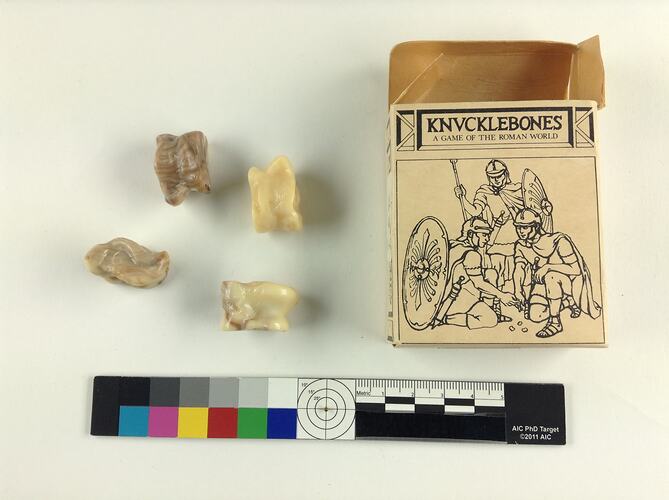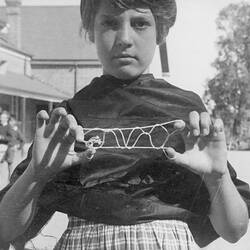Summary
Alternative Name(s): Jacks
Made by Abydos-London, England, circa 1976. Bought at the ancient Roman Baths, in Bath, England.
Knucklebones, or Jacks, is an ancient game, dating back to prehistoric times. The first jacks were natural materials - animal bones, stones, seeds and shells. In ancient Rome, knucklebones were also used as a primitive form of dice, and to prophesy the future. Four knucklebones were used in a gambling game, with each face of the bone being assigned a name and value. These knucklebones are plastic replicas of sheeps' knucklebones, used by the ancient Romans as dice. The printed sheet gives a history of the game and instructions for three games, and is a record of the ancient use of knucklebones for play and recreation by adults. These knucklebones were bought at the ancient Roman Baths in Bath, England, where such games may have been played.
Part of the Australian Children's Folklore Collection, which is unique in Australia, documenting contemporary children's folklore across Australia and in other countries reaching back to the 1870s. The Collection has a strong component of research material relating to Victoria.
Physical Description
Four small plastic replica knucklebones in cardboard box. The knucklebones are marbled brown/bone - one is predominantly bone coloured. Each knucklebone has one of the numbers 1,3,6 and 4 moulded into each face. In the box is an A4 sheet, white with black printing on both sides, giving history and rules of the game. The box is made from off-white cardboard with black print. On front, illustration of Roman soldiers and printed text. On back, further historical notes and an introduction to the games. One side has a price sticker.
More Information
-
Collection Names
-
Collecting Areas
-
Acquisition Information
Cultural Gifts Donation from Dr June Factor, 18 May 1999
-
Acknowledgement
Donated through the Australian Government's Cultural Gifts Program.
-
Manufacturer
-
Inscriptions
On knucklebones: 1,3,4 and 6 moulded into faces. On front of box: 'Knucklebones - A Game of the Roman World'. On back of box: Historical notes - 'Games played with knucklebones have existed for ... three or more players'. On sides of box: 'Knucklebones - A Game of the Roman World'. On price tag on top flap: 'Mementos of Bath 47 237.00 75p'.
-
Classification
-
Category
-
Discipline
-
Type of item
-
overall dimensions
7 cm (Length), 3 cm (Width), 8.5 cm (Height)
-
Keywords
Children's Play, Farm Animals, Games, Gaming Activities, Livestock, Military History, Recreation, Sheep, Making History - Australian Childrens Folklore

